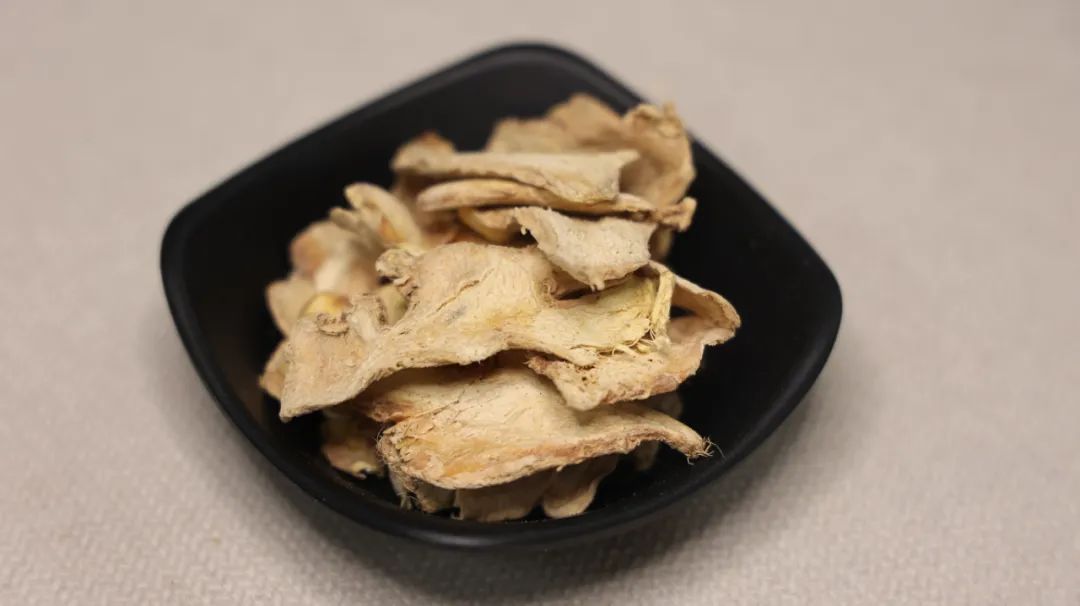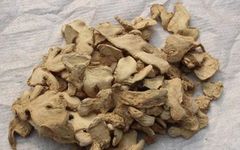Sheng Jiang (生姜, Fresh Ginger) is Sheng Jiang, and Gan Jiang (干姜, Dried Ginger) is Gan Jiang; they are not the same, and their effects differ.
Sheng Jiang is well-known, fresh and moist. Gan Jiang, however, is not simply sun-dried Sheng Jiang; Gan Jiang is made from mature ginger, with the skin peeled off and then dried.
Although both Gan Jiang and Sheng Jiang come from the rhizomes of the ginger family, their medicinal properties are quite different. Gan Jiang is the dried rhizome of mature ginger, while Sheng Jiang is the fresh rhizome that grows from the mature ginger. Gan Jiang is hot in nature and has a more pungent flavor, primarily warming the middle and dispelling cold, reviving yang and unblocking the meridians, particularly affecting the Fei Jing (肺经, Lung Meridian). For instance, when cold has severely invaded the body, Gan Jiang can be chosen to warm the body; Sheng Jiang is warm and pungent, commonly used for wind-cold colds, dispelling dampness and relieving the exterior, and can be used for dysmenorrhea. For example, in cases of wind-cold, slicing two pieces to brew ginger soup can induce sweating; it can also be used to stop vomiting for motion sickness. These two have different natures and effects: Gan Jiang warms the interior, while Sheng Jiang releases the exterior.
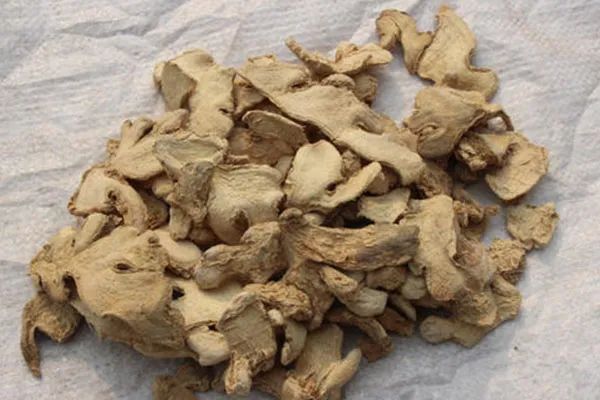
According to Zhang Xichun’s Yixue Zhongzhong Canxi Lu (《医学衷中参西录》), it is recorded: “Plant fresh ginger in the ground, and after autumn, cut it open, peel it, and dry it to make Gan Jiang; plant the buds that grow from the ginger in the ground, and after autumn, cut it open to obtain the ginger grown that year, which is Sheng Jiang. Thus, Gan Jiang is from mature ginger, and Sheng Jiang is from young ginger; Gan Jiang is old while Sheng Jiang is tender.”
Traditional Chinese Medicine (TCM) believes that Gan Jiang is spicy, hot, and drying, “mainly entering the spleen and stomach, excelling in warming the middle, dispelling cold, and strengthening spleen yang,” which greatly helps to warm the middle jiao.
According to ancient texts, any cold syndrome of the spleen and stomach, whether it is “excess syndrome of external cold invading internally” or “deficiency syndrome of insufficient spleen yang,” may use Gan Jiang. From the symptoms, any cold in the spleen and stomach, whether manifested as pain, distension, reduced appetite, indigestion, diarrhea, or nausea and vomiting, can be treated with it.
In ancient times, people often used Gan Jiang alone in decoctions or ground into powder and taken with rice soup to regulate spleen and stomach yang deficiency diarrhea.
From a modern scientific perspective, the cold deficiency syndrome of the spleen and stomach is similar to digestive diseases such as ulcers and gastrointestinal disorders.
Where does Gan Jiang dispel cold? Gan Jiang affects the heart, lungs, and spleen and stomach, meaning it can drive away cold from the upper jiao, but not from the lower jiao.
So what should be done? This is where compatibility comes into play. The best partner for Gan Jiang is Fu Zi (附子, Aconite), which runs through all twelve meridians, carrying Gan Jiang throughout the body, achieving a good effect of dispelling cold.
People with cold in their bodies cannot do without ginger; deep-seated cold often requires Gan Jiang, while superficial cold often uses Sheng Jiang. Gan Jiang guards but does not move, while Sheng Jiang moves but does not guard; they are exactly opposite.
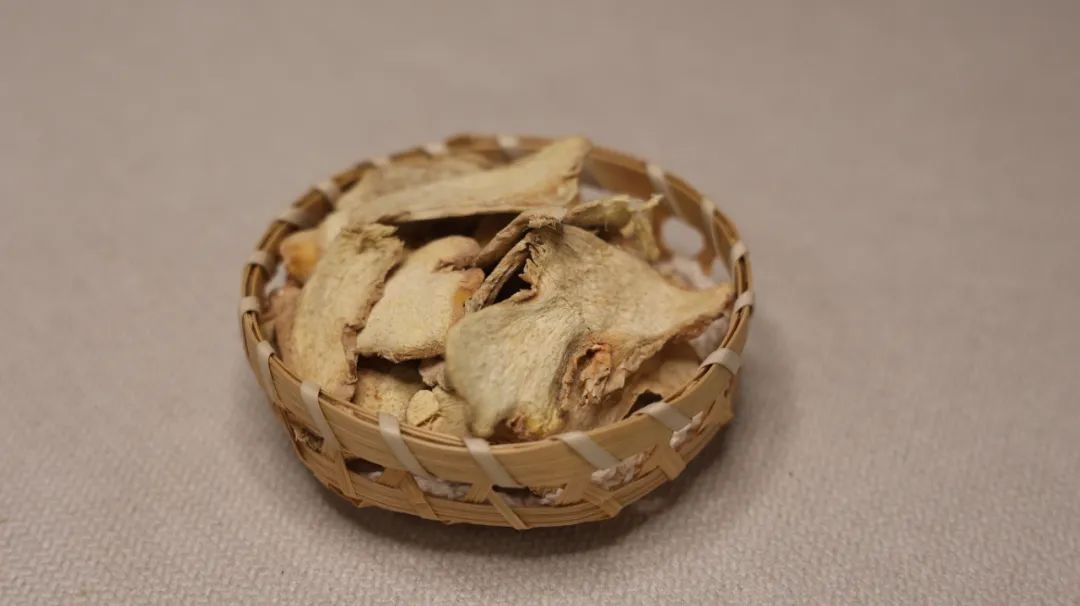 How to use this Gan Jiang well?1. If there is heavy cold in the lungs, with clear, thin phlegm and a feeling of cold in the upper back, this indicates real cold in the lungs. The appropriate prescription is:Gan Jiang 8g + Xi Xin (细辛, Asarum) 5g + Wu Wei Zi (五味子, Schisandra) 3g.This prescription is specifically for resolving lung phlegm; adding Fu Ling (茯苓, Poria) makes it a famous formula:Ling Gan Wu Wei Jiang Xin Tang (苓甘五味姜辛汤), which is specifically used to treat cough and wheezing due to cold phlegm.2. If there is heavy cold in the spleen and stomach, unable to eat cold foods, and prone to diarrhea with a cold abdomen, then use:Gan Jiang with Fu Zi, plus Bai Zhu (白术, Atractylodes) and Ren Shen (人参, Ginseng) and Gan Cao (甘草, Licorice), forming:Fu Zi Li Zhong Wan (附子理中丸), specifically used to dispel cold from the spleen and stomach.3. For cold dampness in the lower back, prone to lower back soreness and pain, which worsens in the morning or after exposure to cold, and the lower back feels cold to the touch, this indicates cold damp lower back pain. The appropriate prescription is:Gan Jiang 8g, Fu Ling 20g, Bai Zhu 15g, Zhi Gan Cao (炙甘草, Honey-fried Licorice) 10g.In fact, this is the Shen Zhuo Tang (肾着汤) from the Jin Gui Yao Lue (金匮要略).
How to use this Gan Jiang well?1. If there is heavy cold in the lungs, with clear, thin phlegm and a feeling of cold in the upper back, this indicates real cold in the lungs. The appropriate prescription is:Gan Jiang 8g + Xi Xin (细辛, Asarum) 5g + Wu Wei Zi (五味子, Schisandra) 3g.This prescription is specifically for resolving lung phlegm; adding Fu Ling (茯苓, Poria) makes it a famous formula:Ling Gan Wu Wei Jiang Xin Tang (苓甘五味姜辛汤), which is specifically used to treat cough and wheezing due to cold phlegm.2. If there is heavy cold in the spleen and stomach, unable to eat cold foods, and prone to diarrhea with a cold abdomen, then use:Gan Jiang with Fu Zi, plus Bai Zhu (白术, Atractylodes) and Ren Shen (人参, Ginseng) and Gan Cao (甘草, Licorice), forming:Fu Zi Li Zhong Wan (附子理中丸), specifically used to dispel cold from the spleen and stomach.3. For cold dampness in the lower back, prone to lower back soreness and pain, which worsens in the morning or after exposure to cold, and the lower back feels cold to the touch, this indicates cold damp lower back pain. The appropriate prescription is:Gan Jiang 8g, Fu Ling 20g, Bai Zhu 15g, Zhi Gan Cao (炙甘草, Honey-fried Licorice) 10g.In fact, this is the Shen Zhuo Tang (肾着汤) from the Jin Gui Yao Lue (金匮要略).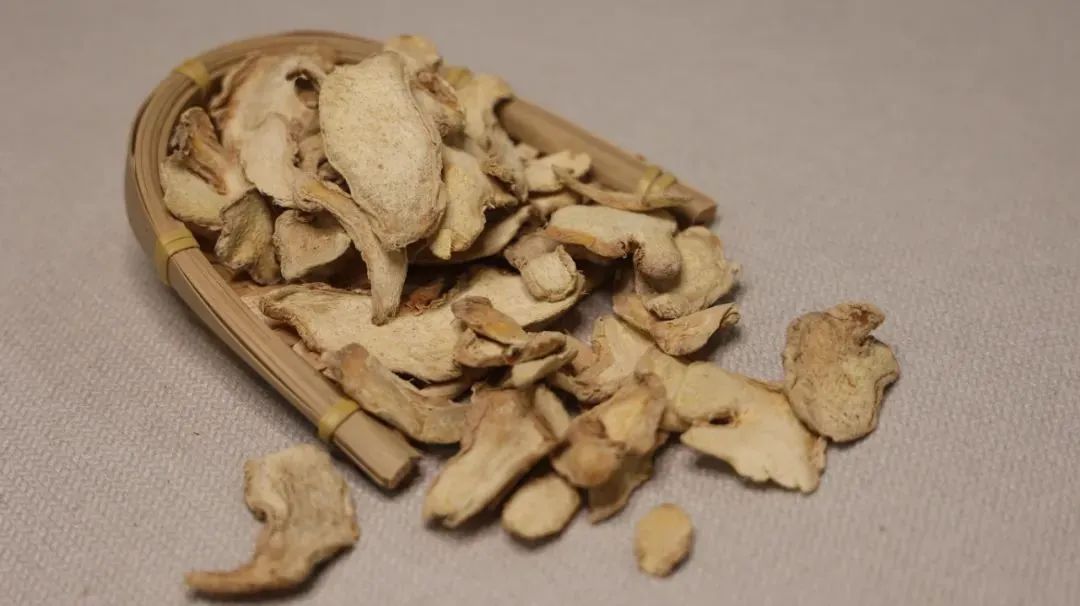 4. For mixed cold-heat syndrome, where eating hot foods causes heat and eating cold foods causes diarrhea, with a feeling of turmoil in the stomach and prone to nausea and vomiting, this is a typical mixed cold-heat syndrome. What to do? Use both cold and heat. Here is a prescription:Gan Jiang 8g + Huang Lian (黄连, Coptis) 5g,to harmonize cold and heat. Use the spicy heat of Gan Jiang to disperse cold, and the bitter cold of Huang Lian to clear excess heat, “spicy opens and bitter descends” to regulate the qi mechanism.Gan Jiang can be taken internally to dispel cold, and Gan Jiang powder can also be used for foot baths, which is also effective for expelling cold; those with heavy cold may try it.
4. For mixed cold-heat syndrome, where eating hot foods causes heat and eating cold foods causes diarrhea, with a feeling of turmoil in the stomach and prone to nausea and vomiting, this is a typical mixed cold-heat syndrome. What to do? Use both cold and heat. Here is a prescription:Gan Jiang 8g + Huang Lian (黄连, Coptis) 5g,to harmonize cold and heat. Use the spicy heat of Gan Jiang to disperse cold, and the bitter cold of Huang Lian to clear excess heat, “spicy opens and bitter descends” to regulate the qi mechanism.Gan Jiang can be taken internally to dispel cold, and Gan Jiang powder can also be used for foot baths, which is also effective for expelling cold; those with heavy cold may try it.
Source: Internet, copyright belongs to the original author. The various viewpoints, prescriptions, and experiences mentioned are for reference and learning only and should not be used as prescriptions. Please do not use blindly; this platform does not bear any responsibility for any consequences!
Disclaimer:Images and text are sourced from the internet, and copyright belongs to the original author. If there are any questions, please contact us for proper handling. The originality and the statements and content in the text have not been verified by this WeChat account, and we do not guarantee or promise the authenticity, completeness, or timeliness of any part of the content. Readers should use it for reference only and verify the relevant content themselves.
